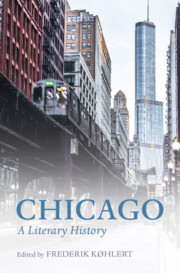Book contents
- Chicago: A Literary History
- Chicago
- Copyright page
- Contents
- Figures
- Contributors
- Acknowledgments
- Introduction: The Literary History of Chicago
- Part I The Rise of Chicago and the Literary West
- Chapter 1 From Prairie to Metropolis: Chicago as the American “Shock City”
- Chapter 2 Birth, Fire, and Rebirth: Edward Payson Roe’s Barriers Burned Away and the Invention of Chicago Literature
- Chapter 3 “This Broad, Free Inland America of Ours”: Hamlin Garland, Chicago, and the Literary West
- Chapter 4 White City: The World’s Columbian Exposition in Literature
- Chapter 5 New Realities, New Realisms: Chicago Literature against the Genteel Tradition
- Part II Business Unusual: A New Urban American Literature
- Part III Radicalism, Modernism, and the Chicago Renaissance
- Part IV A City of Neighborhoods: The Great Depression, Sociology, and the Black Chicago Renaissance
- Part V Traditions and Futures: Contemporary Chicago Literatures
- Selected Bibliography
- Index
Chapter 5 - New Realities, New Realisms: Chicago Literature against the Genteel Tradition
from Part I - The Rise of Chicago and the Literary West
Published online by Cambridge University Press: 02 September 2021
- Chicago: A Literary History
- Chicago
- Copyright page
- Contents
- Figures
- Contributors
- Acknowledgments
- Introduction: The Literary History of Chicago
- Part I The Rise of Chicago and the Literary West
- Chapter 1 From Prairie to Metropolis: Chicago as the American “Shock City”
- Chapter 2 Birth, Fire, and Rebirth: Edward Payson Roe’s Barriers Burned Away and the Invention of Chicago Literature
- Chapter 3 “This Broad, Free Inland America of Ours”: Hamlin Garland, Chicago, and the Literary West
- Chapter 4 White City: The World’s Columbian Exposition in Literature
- Chapter 5 New Realities, New Realisms: Chicago Literature against the Genteel Tradition
- Part II Business Unusual: A New Urban American Literature
- Part III Radicalism, Modernism, and the Chicago Renaissance
- Part IV A City of Neighborhoods: The Great Depression, Sociology, and the Black Chicago Renaissance
- Part V Traditions and Futures: Contemporary Chicago Literatures
- Selected Bibliography
- Index
Summary
Chicago at the end of the nineteenth century epitomized the social transformation happening throughout the United States at the time: an industrial revolution; transformation of technology, architecture, and infrastructure; population growth fueled by immigration; and the rise of organized labor and the growth of socialism and anarchism. Novelists writing about Chicago responded to these changes. Breaking with the “genteel tradition” that persisted in William Dean Howells’s “teacup realism” and Henry James’s aestheticism, Chicago realists represented the city with fierce irony, bleak plotlines, and frank language. Realists such as Henry Blake Fuller employed a wealth of metonymy that would better represent the new social conditions; realists such as Frank Norris employed a coarse style and melodramatic subject-matter that rejected the refinement of East Coast fiction. However, although Chicago novelists hinted at the violence in the heart of the bourgeoisie as well as the poor, their realism remained genteel in its focus on a middle-class, male individual and its reluctance to narrate the social upheavals of immigration, organized labor, and political radicalism.
Keywords
- Type
- Chapter
- Information
- ChicagoA Literary History, pp. 70 - 80Publisher: Cambridge University PressPrint publication year: 2021



